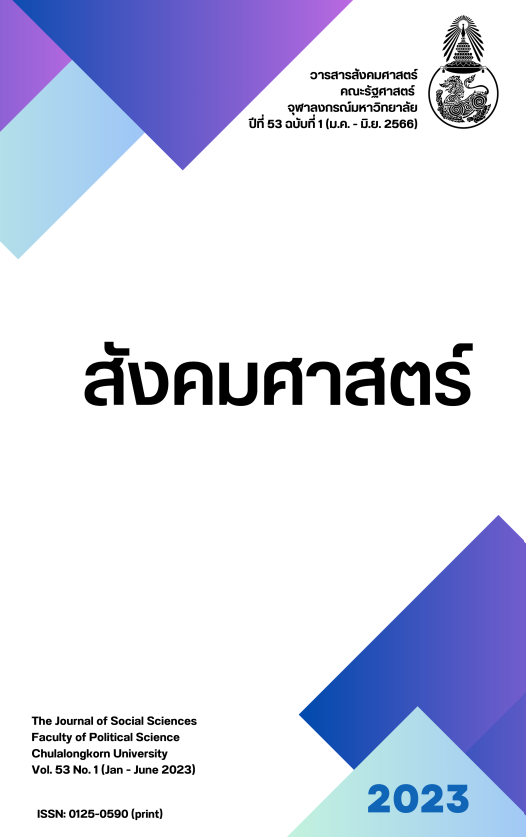Revisiting the Geography of Globalisation in the Covid-19 Pandemic using Risk Theory
DOI:
https://doi.org/10.61462/cujss.v53i1.1275คำสำคัญ:
Geography, Globalisation, Ulrich Beck, Risk Society, Knowledge Productionบทคัดย่อ
My review paper is part of Covid-IAS Project, funded by National Research Council of Thailand. The paper focuses on the geography of globalisation in the Covid -19 pandemic. I employ Ulrich Beck’s concept of risk society to critically examine geography. Although Beck is not a geography theorist, his theory can be used extensively and alternatively to study the geography of globalisation. By drawing upon Beck, I argue that the geography of globalisation in the context of Covid -19 displays forms of dependency upon the politics of knowledge about Covid -19 vaccines. With the production of knowledge, the vaccines have caused various forms of dependency, including global dependency (external knowledge about the effectiveness of the vaccines and their side-effects), regional dependency and international dependency (the EU and its member states), the interplay between global dependency and international dependency (COVAX), and the emergence of the nation states as regional production hubs (AstraZeneca vaccine). Although Beck’s theory enables us to critically investigate the geography of globalisation, Beck ignores the significance of the nation states in globalised risk situation. In contrast with Beck, I suggest that nation states have still played important roles in world risk society, especially in the context of Covid -19.
Downloads
เอกสารอ้างอิง
AstraZeneca. 2021. “Pushing Boundaries to Deliver COVID-19 Vaccine across the Globe.” 2021. accessed June 19, 2021. https://www.astrazeneca.com/what-science-can-do/topics/technologies/pushing-boundaries-to-deliver-covid-19-vaccine-accross-the-globe.html.
Bangkok Post. 2021. “AstraZeneca Says ‘Working’ with SE Asian Nations on Vaccine Deliveries.” Bangkok Post, June 10, 2021. accessed June 10, 2021. https://www.bangkokpost.com/thailand/general/2130135/astrazeneca-says-working-with-se-asian-nations-on-vaccine-deliveries.
BBC. 2021a. “Coronavirus: Setback for EU in Legal Fight with AstraZeneca.” BBC News, 2021, sec. Europe. accessed June 18, 2021. https://www.bbc.com/news/world-europe-57531064.
BBC. 2021b. “Covax: How Many Covid Vaccines Have the US and the Other G7 Countries Pledged?” BBC News, 2021, sec. World. accessed September 23, 2021. https://www.bbc.com/news/world-55795297.
BBC. 2021c. “Covid: What Is Happening with the EU Vaccine Rollout?” BBC News, 2021, sec. Explainers. accessed June 21, 2021. https://www.bbc.com/news/explainers-52380823.
Beck, Ulrich. 1992. Risk Society: Towards a New Modernity. 1st edition. London; Newbury Park, Calif: SAGE Publications Ltd.
Beck, Ulrich. 2002. “The Cosmopolitan Society and Its Enemies.” Theory, Culture & Society 19 (1–2): 17–44. https://doi.org/10.1177/026327640201900101.
Brenner, Neil. 1999. “Beyond State-Centrism? Space, Territoriality, and Geographical Scale in Globalization Studies.” Theory and Society 28(1): 39–78. https://doi.org/10.1023/A:1006996806674.
Castells, Manuel. 1999. “Grassrooting the Space of Flows.” Urban Geography 20 (4): 294–302. https://doi.org/10.2747/0272-3638.20.4.294.
Connolly, Kevin. 2021. “Sputnik V: How Russia’s Covid Vaccine Is Dividing Europe.” BBC News, April 17, 2021, sec. Europe. https://www.bbc.com/news/world-europe-56735931.
Enderwick, Peter, and Peter J. Buckley. 2020. “Rising Regionalization: Will the Post-COVID-19 World See a Retreat from Globalization.” Transnational Corporations 27(2), 99–112. https://doi.org/10.18356/8008753a-en.
Giddens, Anthony. 2002. Runaway World: How Globalization Is Reshaping Our Lives. 1st edition. New York, NY: Routledge.
Harvey, David. 2001. “Globalization and the ‘Spatial Fix.’” Geographische Revue : Zeitschrift Für Literatur Und Diskussion 3(2), 23–30.
McCann, Philip. 2008. “Globalization and Economic Geography: The World Is Curved, Not Flat.” Cambridge Journal of Regions, Economy and Society 1(3): 351–70. https://doi.org/10.1093/cjres/rsn002.
Robertson, Roland. 1994. “Globalisation or Glocalisation?” The Journal of International Communication 1(1), 33–52. https://doi.org/10.1080/13216597.1994.9751780.
Sassen, Saskia. 2003. “Globalization or Denationalization?” Review of International Political Economy 10 (1): 1–22.
Sforza, Alessandro, and Marina Steininger. 2020. “Globalization in the Time of Covid-19.” CESifo Working Paper No. 8184. Munich: Center for Economic Studies and ifo Institute (CESifo). accessed May 25, 2021. https://www.cesifo.org/en/publications/2020/working-paper/globalization-time-covid-19.
Wallerstein, Immanuel. 1975. “Preface: The Present State of the Debate on World Inequality.” In World Inequality: Origins and Perspectives on the World System, edited by Immanuel Wallerstein. Montreal: Black Rose Books Ltd.
Wallerstein, Immanuel. 2004. World-Systems Analysis: An Introduction. Durham: Duke University Press. https://doi.org/10.2307/j.ctv11smzx1.
WHO. 2021a. “COVAX Working for Global Equitable Access to COVID-19 Vaccines.” 2021. accessed June 19, 2021. https://www.who.int/initiatives/act-accelerator/covax.
WHO. 2021b. “Side Effects of COVID-19 Vaccines.” March 31, 2021. https://www.who.int/news-room/feature-stories/detail/side-effects-of-covid-19-vaccines.
WHO. 2021c. “Background Document on the Inactivated COVID-19 Vaccine BIBP Developed by China National Biotec Group (CNBG), Sinopharm.” May 7, 2021. https://www.who.int/publications-detail-redirect/WHO-2019-nCoV-vaccines-SAGE_recommendation-BIBP-background-2021.1.
WHO. 2021d. “WHO Lists Additional COVID-19 Vaccine for Emergency Use and Issues Interim Policy Recommendations.” May 7, 2021. https://www.who.int/news/item/07-05-2021-who-lists-additional-covid-19-vaccine-for-emergency-use-and-issues-interim-policy-recommendations.
WHO. 2021e. “Interim Recommendations for Use of the Moderna MRNA-1273 Vaccine against Covid-19.” June 15, 2021. https://www.who.int/publications/i/item/interim-recommendations-for-use-of-the-moderna-mrna-1273-vaccine-against-covid-19.
WHO. 2021f. “Interim Recommendations for Use of the Pfizer–BioNTech COVID-19 Vaccine, BNT162b2, under Emergency Use Listing.” June 15, 2021. https://www.who.int/publications-detail-redirect/WHO-2019-nCoV-vaccines-SAGE_recommendation-BNT162b2-2021.1.
WHO. 2021g. “Interim Recommendations for Use of the ChAdOx1-S [Recombinant] Vaccine against COVID-19 (AstraZeneca COVID-19 Vaccine AZD1222 VaxzevriaTM, SII COVISHIELDTM).” July 30, 2021. accessed June 14, 2023. https://www.who.int/publications-detail-redirect/WHO-2019-nCoV-vaccines-SAGE_recommendation-AZD1222-2021.1.
Wimmer, Jeffrey, and Thorsten Quandt. 2006. “Living in the Risk Society.” Journalism Studies 7(2), 336–47. https://doi.org/10.1080/14616700600645461.
ดาวน์โหลด
เผยแพร่แล้ว
รูปแบบการอ้างอิง
ฉบับ
ประเภทบทความ
สัญญาอนุญาต
ลิขสิทธิ์ (c) 2023 คณะรัฐศาสตร์ จุฬาลงกรณ์มหาวิทยาลัย

อนุญาตภายใต้เงื่อนไข Creative Commons Attribution-NonCommercial-NoDerivatives 4.0 International License.
เงื่อนไขการอนุญาตสาธารณะ
นโยบายลิขสิทธิ์และการอนุญาต
วารสารสังคมศาสตร์ จุฬาลงกรณ์มหาวิทยาลัย เผยแพร่เนื้อหาทั้งหมดภายใต้ สัญญาอนุญาตครีเอทีฟคอมมอนส์แบบแสดงที่มา-ไม่ใช้เพื่อการค้า-ไม่ดัดแปลง 4.0 นานาชาติ (CC BY-NC-ND 4.0)
ลิขสิทธิ์
บทความทั้งหมดที่ตีพิมพ์ในวารสารสังคมศาสตร์ จุฬาลงกรณ์มหาวิทยาลัย เป็นลิขสิทธิ์ของ คณะรัฐศาสตร์ จุฬาลงกรณ์มหาวิทยาลัย ผู้เขียนจะโอนสิทธิ์ทั้งหมดให้แก่วารสารเมื่อบทความได้รับการตอบรับให้ตีพิมพ์
สัญญาอนุญาต CC BY-NC-ND 4.0
ภายใต้สัญญาอนุญาตนี้:
-
แสดงที่มา (BY): ผู้ใช้ต้องแสดงที่มาโดยอ้างอิงถึงผู้เขียน คณะรัฐศาสตร์ จุฬาลงกรณ์มหาวิทยาลัย และวารสารสังคมศาสตร์ จุฬาลงกรณ์มหาวิทยาลัย พร้อมทั้งให้ลิงก์ไปยังสัญญาอนุญาต และระบุหากมีการเปลี่ยนแปลง ทั้งนี้สามารถทำได้ในลักษณะที่สมเหตุสมผล แต่ต้องไม่ทำในลักษณะที่แสดงว่าผู้อนุญาตให้การรับรองผู้ใช้หรือการใช้งานดังกล่าว
-
ไม่ใช้เพื่อการค้า (NC): ผู้ใช้ไม่สามารถใช้เนื้อหาเพื่อวัตถุประสงค์ทางการค้า การใช้งานเชิงพาณิชย์จะต้องได้รับอนุญาตเป็นลายลักษณ์อักษรล่วงหน้าจากผู้เขียนและคณะรัฐศาสตร์ จุฬาลงกรณ์มหาวิทยาลัย
-
ไม่ดัดแปลง (ND): หากผู้ใช้นำเนื้อหาไปรวม ดัดแปลง หรือต่อยอด ผู้ใช้ไม่สามารถเผยแพร่งานที่ดัดแปลงนั้นได้ การดัดแปลงผลงานจะต้องได้รับอนุญาตเป็นลายลักษณ์อักษรล่วงหน้าจากผู้เขียนและคณะรัฐศาสตร์ จุฬาลงกรณ์มหาวิทยาลัย
นโยบายการเข้าถึงแบบเปิด
วารสารสังคมศาสตร์ จุฬาลงกรณ์มหาวิทยาลัย ให้การเข้าถึงเนื้อหาแบบเปิดโดยทันทีตามหลักการที่ว่าการทำให้งานวิจัยสามารถเข้าถึงได้อย่างเสรีแก่สาธารณะจะสนับสนุนการแลกเปลี่ยนความรู้ในระดับโลก ผู้ใช้สามารถอ่าน ดาวน์โหลด คัดลอก เผยแพร่ พิมพ์ ค้นหา หรือเชื่อมโยงไปยังเนื้อหาฉบับเต็มของบทความได้โดยไม่ต้องขออนุญาตล่วงหน้าจากผู้จัดพิมพ์หรือผู้เขียน ทั้งนี้เป็นไปตามสัญญาอนุญาต CC BY-NC-ND 4.0
นโยบายการเก็บบันทึกด้วยตนเอง
ผู้เขียนสามารถเก็บบันทึกบทความฉบับตีพิมพ์สุดท้าย ต้นฉบับที่ส่ง (preprint) หรือฉบับที่ผ่านการประเมิน (postprint) ในคลังสถาบันหรือเว็บไซต์ส่วนตัวได้ โดยต้องมีการอ้างอิงการตีพิมพ์ครั้งแรกในวารสารสังคมศาสตร์ จุฬาลงกรณ์มหาวิทยาลัย พร้อมระบุแหล่งอ้างอิงที่สมบูรณ์และลิงก์ไปยังเว็บไซต์ของวารสาร
การขออนุญาต
สำหรับการใช้งานนอกเหนือจากที่ครอบคลุมโดยสัญญาอนุญาต CC BY-NC-ND 4.0 กรุณาติดต่อ:
กองบรรณาธิการ
วารสารสังคมศาสตร์ จุฬาลงกรณ์มหาวิทยาลัย
คณะรัฐศาสตร์ จุฬาลงกรณ์มหาวิทยาลัย
Email: cusocscij@gmail.com
สำหรับข้อมูลเพิ่มเติมเกี่ยวกับสัญญาอนุญาตครีเอทีฟคอมมอนส์แบบแสดงที่มา-ไม่ใช้เพื่อการค้า-ไม่ดัดแปลง 4.0 นานาชาติ กรุณาเยี่ยมชม: https://creativecommons.org/licenses/by-nc-nd/4.0/deed.th





